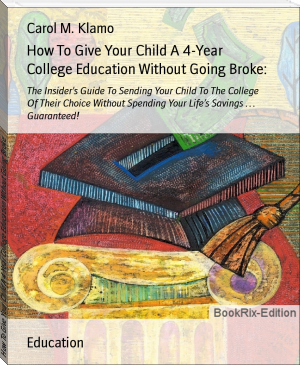How To Give Your Child A 4-Year College Education Without Going Broke: - Carol M. Klamo (top novels to read txt) 📗

- Author: Carol M. Klamo
Book online «How To Give Your Child A 4-Year College Education Without Going Broke: - Carol M. Klamo (top novels to read txt) 📗». Author Carol M. Klamo
The credit is gradually reduced if your income is between $47,000 and $60,000 ($94,000 and $120,000 filing a joint return). Again, there are always exceptions to the rules.
It’s important to note that both the Hope and Lifetime Learning credits are calculated according to “out-of-pocket” expenses. Scholarships and grants may reduce the credit; loans may not.
• Deduct Interest on Student Loans
The deduction is equal to the interest paid during the tax year on any qualified education loan up to an annual maximum of $2,500. The deduction is taken as an adjustment to income, so it can be taken even if deductions aren’t itemized on Schedule A of the 1040. The deduction is phased out for taxpayers with adjusted gross incomes of $55,000 to $70,000 (single filers) and $110,000 to $140,000 (married filing jointly). Taxpayers who are married but file separate returns are not eligible.
The interest must be paid on a qualified education loan for you, your spouse, or someone who was your dependent when the money was borrowed. You must not be claimed as an exemption on someone else’s tax return. The person for whom the expenses were incurred must have been enrolled at least half-time in a degree program. Parents who do not qualify because of the income phase outs should consider having their child borrow the funds. Not only does the Stafford Loan have a lower interest rate than the PLUS loan, but the student is less likely to exceed the income phase outs.
I’d like to point out at this time that there is a difference between a deduction and a credit. A deduction reduces the amount of income subject to tax. A tax credit reduces the amount of income tax you have to pay. For example, a $1,000 tax deduction in a 28% tax bracket saves you $280 in taxes but a $1,000 tax credit in any bracket saves you a $1,000 in taxes.
That’s the good news.
There’s also a fair amount of bad news:
• First, all these benefits come with a sale-by date.
Some provisions in the law only last a few years ( for example, Obama extended the Hope Credit to four years but that ends in 2012 however, most experts expect this provision to continue to be extended at least until they simplify these education related tax breaks.) As things stand now, the entire tax code could be invalid after any given special session in Congress. That’s definitely something to consider if you’ve got more than one child heading to college over the next few years.
• Some middle-income families may be cut out of many of the new benefits.
If you earn more than $80,000 (or $150,000 for joint filers), for example, you won’t get the full $2,500 of student loan interest deductions. If your income is over $90,000 (or $180,000 for joint filers), you won’t get any of these deductions.
• Timing is crucial.
Because your eligibility for some of these deductions will depend on the tax year you make the payments, you’ll have to plan all your college payments very carefully. Pay a tuition fee too early, and you could find yourself unable to claim a tax credit!
• You can’t win them all!
Applying for one credit may well make you ineligible for another. The same child, for example, cannot earn you both a Hope Credit and a Lifetime Learning Credit in the same year. Nor can you claim either of these credits for expenses paid with money pulled out of 529 Plans or Coverdell ESA’s.
• Most importantly, many of these benefits will have an effect on your EFC.
Picking up a Hope Credit or Lifetime Learning Credit, for example, will leave you with more untaxed income. That means colleges may lower their financial aid packages. You should still end up paying less money, but you’ll need to figure out precisely how much.
* * *
Whew!
Pretty confusing stuff, huh?
The truth is...
If Your CPA Or Tax Preparer Doesn’t Understand How The Financial Aid System Works…
His use of these tax rules to save you $2,500 in taxes (The maximum allowed by law) could cost you many more thousands of dollars in lost financial aid!
Where does that leave you as a parent of a college-bound student?
Up the creek if you don’t understand how each of these provisions applies to you, and which credit is best to take and when.
One of the results of the new tax law is that individual advice has become more important than ever.
One solution will not fit all!
The way parents of college children arrange their finances to pay tuition fees will now vary more widely than ever from one family to another.
The only way to make sure you’re not paying more than you need for your child’s education is to sit down with a qualified college funding expert and find the best financial arrangement for you!
Chapter #11
“How To Get Maximum Money For
College If You’re Divorced, A Minority,
Own A Business, Recently Unemployed,
Or The Parent Of An Athlete...”
In this chapter, we’re going to talk about special topics or circumstances if your family situation doesn’t fit into the “norm”.
What I mean by the “norm” is...married, average student, average grades, employed by a company (not your own), non-minority, etc. You get the point.
Anyway, most families, in one way or another, don’t fit into the statistical norm, and must be aware of how this will affect their chances of qualifying for financial aid.
So without further ado, let’s talk about...
Vital Things You Must Know If You Fit Into
One Or More Of The Following Categories:
Category #1
- Divorced Or Separated Parents.
If you are currently divorced or separated (or will be soon), and your child will be applying to colleges next year, there are a few key things you should be aware of:
1. The financial aid forms should be completed by the parent with whom the student lives for the greater part of the year. For example, if a child lives with his mother for 8 months out of the year and with his father only 4 months, the income and asset information should be based on the mother only
.
2. If the parent with whom the child resides is remarried, you must
include the income and the assets of the stepparent as if he or she was the biological parent. This may not sound fair, but this is the way the financial aid formulas work.
3. Private colleges and universities can
ask to see the income and asset information of the “other” divorced parent when awarding their own funds. However, this information will not
affect federally based funds.
Category #2
- Academically Or Athletically Gifted Students, And Minorities.
Although most financial aid is based on “need”, it is also important to remember that financial aid packages are based to some extent on how badly colleges need
your child.
There are three major areas that you should pay close attention to when applying for financial aid:
1. Academically Gifted Students
– One of the primary scholarships awarded based on academic merit is the National Merit Scholarship Program. It is given to students who do extremely well on their PSAT/NMSQT scores. Also, many schools (outside of the Ivy League) try to attract top students away from the more highly rated schools by offering academic scholarships. If your child is academically gifted, use this as a bargaining chip.
2. Athletes
- Even if your child is not Division #1 sports material, don’t assume that Division #2 or #3 schools won’t offer you preferential packaging (more grants, less loans) to attract your child to their school. Make sure you get in touch with the athletic department and make it a point to meet the coach at each school you visit. Also, get the high school coach to write letters of recommendation to each school.
3. Minorities
- If your child is Black, Hispanic, or Native American, contact the colleges and find out about the availability of scholarship programs for minorities. Although there is some debate over awarding these types of scholarships, colleges in 19 states currently make these types of awards.
Category #3
- Owning Your Own Business.
If you currently own your own business, or you are thinking of starting one, there are significant benefits when it comes to getting money for college.
To begin with, business assets are counted much less
heavily than personal assets.
Also, you have the ability to control (or lower) your income during the years that your child is in college, thereby making you eligible for more financial aid.
All in all, owning or starting a business can be a big help in getting money for college. But you must be sure to understand “The Higher Education Reconciliation Act of 2005” as it pertains to small business exclusions and how this will impact the Federal as well as the Institutional formulas.
Category #4
- Recently Unemployed
.
If you were recently terminated, or have received notice that you will be terminated, or if you own your own business and cannot make a living due to current economic conditions, you must
make the college financial aid officer aware of this.
There is something called “special circumstances” and a financial aid officer can use “professional judgment” to help you out in this situation.
Most frequently, what they can do for you is use “expected income” rather than the previous year’s income which is more reflective of your current financial state.
Category #5
- Independent Students
.
For those of you who plan to try to make your child appear to be “independent” so you can get more financial aid, you’re in for a shock!
There are 7 criteria that will be used to determine whether or not your child will be considered independent:
1. They will be 24 years of age or older before December 31st of their 1st year of college.
2. They are a veteran of the armed forces or are serving on active duty for purposes other than training.
3. They are an orphan or ward of the court.
4. They have legal dependents.
5. They are a graduate or professional student.
6. They are married.
7. If the financial aid administrator declares you independent based on documented special circumstances.
If your child doesn’t fit into one of the above criteria, forget about trying to prove that they are independent - it won’t work!
Category #6
- Applying For Early Decision.
If you plan to apply for financial aid, I have only one recommendation concerning applying for early decision...
Don’t Do It!
If your child gets accepted to a school for early decision, they must go to that school even if they offer you a horrible package. The school is also aware of this which gives them an incentive to “under-award” you.
If you still decide to apply for early decision, just be forewarned.
I would like to note, however, that in the admissions process, your child will have about a 30% better chance of being accepted so make





Comments (0)